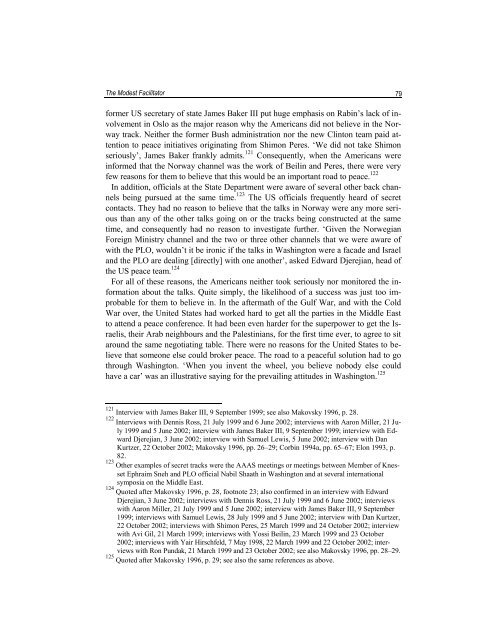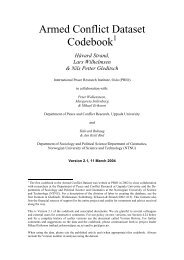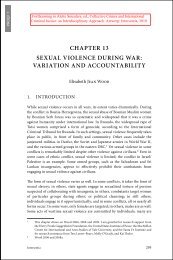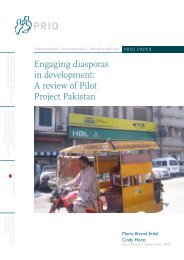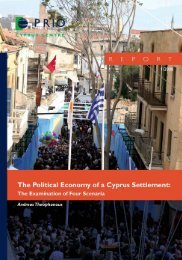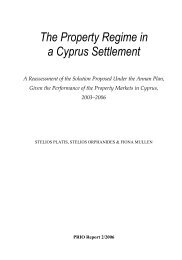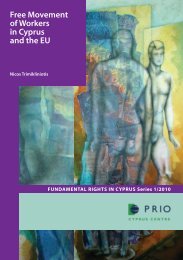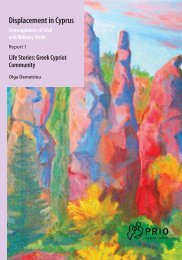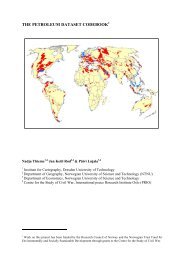Peacemaking Is a Risky Business - PRIO
Peacemaking Is a Risky Business - PRIO
Peacemaking Is a Risky Business - PRIO
Create successful ePaper yourself
Turn your PDF publications into a flip-book with our unique Google optimized e-Paper software.
The Modest Facilitator79former US secretary of state James Baker III put huge emphasis on Rabin’s lack of involvementin Oslo as the major reason why the Americans did not believe in the Norwaytrack. Neither the former Bush administration nor the new Clinton team paid attentionto peace initiatives originating from Shimon Peres. ‘We did not take Shimonseriously’, James Baker frankly admits. 121 Consequently, when the Americans wereinformed that the Norway channel was the work of Beilin and Peres, there were veryfew reasons for them to believe that this would be an important road to peace. 122In addition, officials at the State Department were aware of several other back channelsbeing pursued at the same time. 123 The US officials frequently heard of secretcontacts. They had no reason to believe that the talks in Norway were any more seriousthan any of the other talks going on or the tracks being constructed at the sametime, and consequently had no reason to investigate further. ‘Given the NorwegianForeign Ministry channel and the two or three other channels that we were aware ofwith the PLO, wouldn’t it be ironic if the talks in Washington were a facade and <strong>Is</strong>raeland the PLO are dealing [directly] with one another’, asked Edward Djerejian, head ofthe US peace team. 124For all of these reasons, the Americans neither took seriously nor monitored the informationabout the talks. Quite simply, the likelihood of a success was just too improbablefor them to believe in. In the aftermath of the Gulf War, and with the ColdWar over, the United States had worked hard to get all the parties in the Middle Eastto attend a peace conference. It had been even harder for the superpower to get the <strong>Is</strong>raelis,their Arab neighbours and the Palestinians, for the first time ever, to agree to sitaround the same negotiating table. There were no reasons for the United States to believethat someone else could broker peace. The road to a peaceful solution had to gothrough Washington. ‘When you invent the wheel, you believe nobody else couldhave a car’ was an illustrative saying for the prevailing attitudes in Washington. 125121 Interview with James Baker III, 9 September 1999; see also Makovsky 1996, p. 28.122 Interviews with Dennis Ross, 21 July 1999 and 6 June 2002; interviews with Aaron Miller, 21 July1999 and 5 June 2002; interview with James Baker III, 9 September 1999; interview with EdwardDjerejian, 3 June 2002; interview with Samuel Lewis, 5 June 2002; interview with DanKurtzer, 22 October 2002; Makovsky 1996, pp. 26–29; Corbin 1994a, pp. 65–67; Elon 1993, p.82.123 Other examples of secret tracks were the AAAS meetings or meetings between Member of KnessetEphraim Sneh and PLO official Nabil Shaath in Washington and at several internationalsymposia on the Middle East.124 Quoted after Makovsky 1996, p. 28, footnote 23; also confirmed in an interview with EdwardDjerejian, 3 June 2002; interviews with Dennis Ross, 21 July 1999 and 6 June 2002; interviewswith Aaron Miller, 21 July 1999 and 5 June 2002; interview with James Baker III, 9 September1999; interviews with Samuel Lewis, 28 July 1999 and 5 June 2002; interview with Dan Kurtzer,22 October 2002; interviews with Shimon Peres, 25 March 1999 and 24 October 2002; interviewwith Avi Gil, 21 March 1999; interviews with Yossi Beilin, 23 March 1999 and 23 October2002; interviews with Yair Hirschfeld, 7 May 1998, 22 March 1999 and 22 October 2002; interviewswith Ron Pundak, 21 March 1999 and 23 October 2002; see also Makovsky 1996, pp. 28–29.125 Quoted after Makovsky 1996, p. 29; see also the same references as above.


